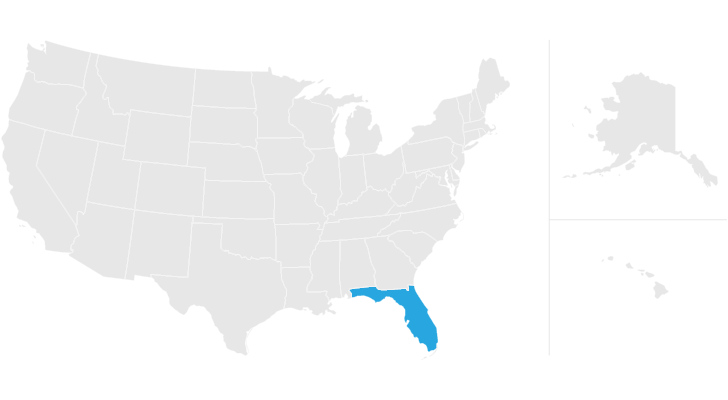Florida Estate Tax

There is no Florida estate tax, though you may still be subject to the federal estate tax. It’s one of 38 states in the country that doesn’t levy a tax on estates, regardless of size. If you’re concerned about planning your estate or any other financial planning concerns, you may want to consider getting professional help from a financial advisor. SmartAsset’s financial advisor matching service can help find one in your area who meets your needs.
Florida Estate Tax
There is no estate tax in Florida. The state abolished it’s estate tax in 2004.
What Is the Estate Tax?
Estate taxes are levied by the government on the estate of a recently deceased person. It only applies to estates worth a certain amount, which varies based on which municipality is levying the tax. You may have heard the term “death tax,” but estate tax is the legal term.
This tax is different from the inheritance tax, which is levied on money after is has been passed on to the deceased’s heirs.
Florida Inheritance Tax and Gift Tax

Florida does not have an inheritance tax, but other states’ inheritance taxes may apply to you. In Pennsylvania, for instance, the inheritance tax may apply to you even if you live out of state, as long as the deceased lived in the state. You’ll need to check the laws of the state where the person you are inheriting from lived.
Florida also has no gift tax. The federal gift tax applies only to gifts of more than $14,000 in 2017 and $15,000 in 2018.
Federal Estate Tax
Even though Florida doesn’t have an estate tax, you might still owe the federal estate tax, which kicks in at $11.18 million for 2018. The exemption increased after the new tax legislation was signed in 2017. The federal estate tax exemption is portable for married couples. If a married couple takes the right legal steps, they can have an exemption of up to $22.36 million after both spouses have died. If an estate exceeds that amount, the top tax rate is 40%.
A full chart of federal estate tax rates is below. Here’s how it works. Let’s say your estate is worth $11.5 million and you aren’t married. Subtracting the exemption of $11.18 million, creates a taxable estate of $320,000. Your base payment is $70,800 on the first $250,000. You also pay 34% on the remaining $70,000, which comes to $23,800. That, plus the base of $70,800, means your total estate tax burden is $94,600.
FEDERAL ESTATE TAX RATES Taxable Estate* Base Taxes Paid Marginal Rate Rate Threshold** $1 – $10,000 $0 18% $1 $10,000 – $20,000 $1,800 20% $10,000 $20,000 – $40,000 $3,800 22% $20,000 $40,000 – $60,000 $8,200 24% $40,000 $60,000 – $80,000 $13,000 26% $60,000 $80,000 – $100,000 $18,200 28% $80,000 $100,000 – $150,000 $23,800 30% $100,000 $150,000 – $250,000 $38,800 32% $150,000 $250,000 – $500,000 $70,800 34% $250,000 $500,000 – $750,000 $155,800 37% $500,000 $750,000 – $1 million $248,300 39% $750,000 Over $1 million $345,800 40% $1 million
*The taxable estate is the total above the exemption of $11.18 million.
**The rate threshold is the point at which the marginal estate tax rate kicks in.
Overall Florida Tax Picture

Florida has a reputation for being a low-tax state. There is no state income tax in Florida which means that income, Social Security, retirement accounts and pension plans are all free of taxes. This makes Florida is a very tax-friendly state for retirees. You can calculate your take home pay using our Florida paycheck calculator.
The state sales tax is 6%, but taking into account local sales taxes, that rate can reach up to 8%. Property taxes in Florida are right in the middle of the pack nationwide, with an average effective rate of 1.02%.
Estate Planning Tips
If you’re planning your estate, enlisting a professional to help you might be your best bet. SmartAsset has a financial advisor matching tool to help you do just that. First you’ll answer a series of questions about your finances and your preferences and then SmartAsset will match you with up to three financial advisors in your area. The advisors will receive your information and contact you to set up a time to talk and see if they are a good fit for your needs. All of the advisors on the platform have been fully vetted and have records clean of disclosures.
In estate planning, it is key to know how much your assets total, including your savings. Use SmartAsset’s savings calculator to figure out how quickly your current savings will grow based on how much you have and how it is being stored. This way, your estate planning can be as accurate as possible.
When writing a will, make sure you know and stick to the legal guidelines. A lawyer can help you do this, but you should also make sure you’re aware of all the rules governing how your will can operate.
Photo credit: ©iStock.com/Natee Meepian, SmartAsset, ©iStock.com/jganser
The post Florida Estate Tax appeared first on SmartAsset Blog.
